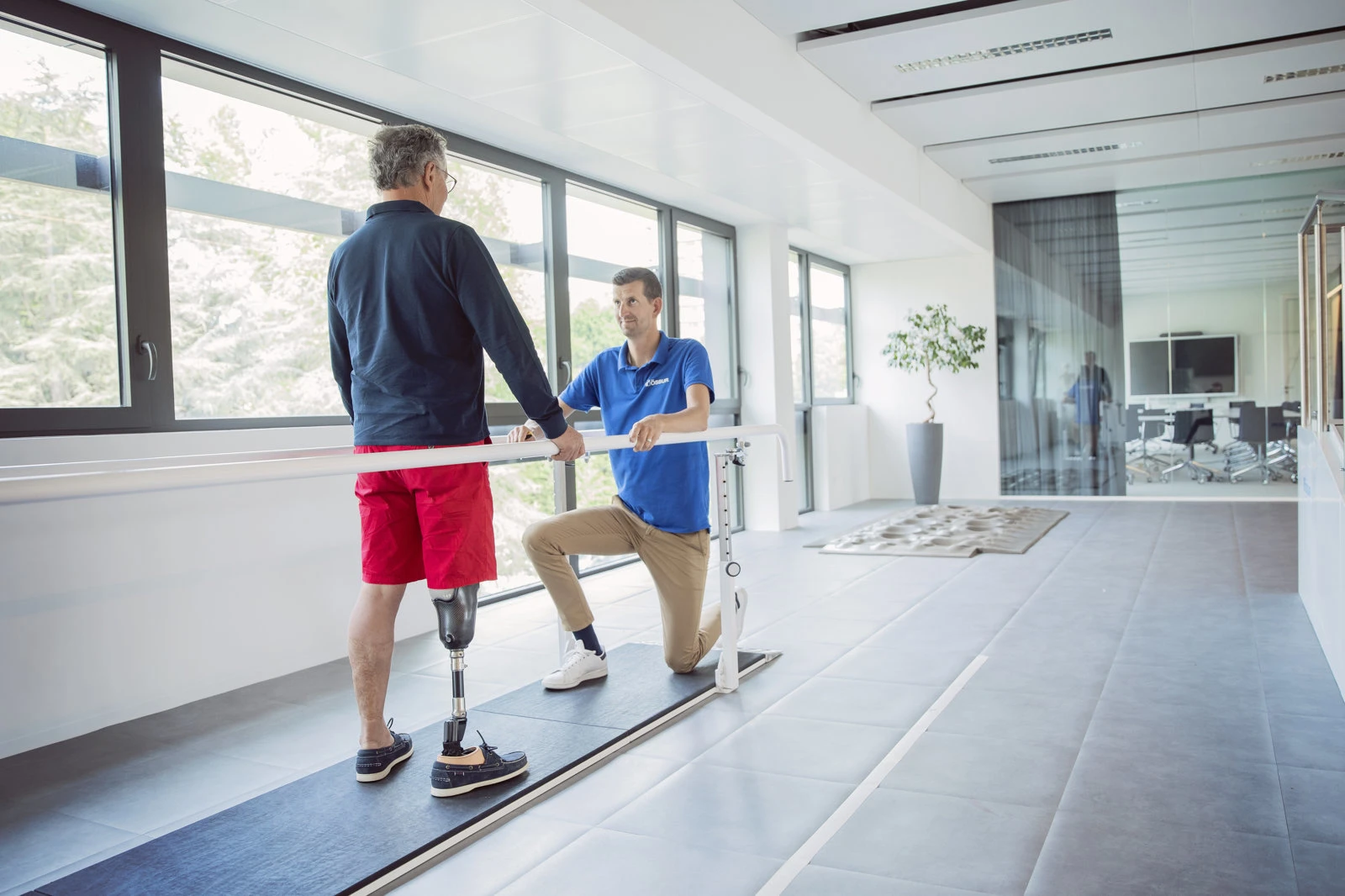Welcome To Amputee Care Center
powered by Spronken

Rehabilitation after an arm or leg amputation is intensive. How exactly the rehabilitation proceeds varies from person to person. For instance, it depends on the type of amputation, your overall health and on the prosthesis made for you. At Amputee Care Center, we would like to tell you more about what to expect after amputation and what factors affect prosthesis rehabilitation.
Rehabilitation after arm amputation is often complex. You use your arm throughout the day for all kinds of ‘simple’ activities such as eating, writing and dressing. An arm prosthesis must therefore be precisely tailored to your needs in order to be able to perform your daily activities again. At the Amputee Care Center, we make a unique prosthesis and always provide tailor-made care. After all, every arm amputation and every person is different, and so is prosthetic rehabilitation. A correct arm prosthesis and customised amputation care help to significantly improve quality of life.
Leg prostheses mainly focus on mobility. Rehabilitation after leg amputation initially focuses on standing and walking. After that, your personal goals come into play, of course. At Amputee Care Center, we specialise in a wide range of prostheses, from simple models to sports prostheses, which allow you to play full sports again, such as a blade prosthesis, a bicycle prosthesis or a golf prosthesis.
The complexity of a leg prosthesis depends mainly on whether the amputation level is a transtibial amputation (below the knee) or transfemoral amputation (above the knee). The Amputee Care Center specialises in lower leg prostheses and upper leg prostheses. We often make a leg prosthesis in 1 day!

Amputee Care Center is known for their specialised total care and support for people who have just undergone an amputation. The prosthetics team offers tailor-made prosthetic rehabilitation programmes that take into account the type of amputation, amputation level and individual needs of the patient. This can contribute to faster and more effective rehabilitation.
In short, walking within 7 weeks after a leg amputation, for which the Amputee Care Center is known, is possible in some cases. Full rehabilitation and learning to use a prosthesis optimally usually takes more time.
For children, growth factors also still play an important role. Rehabilitation after amputation for children requires a specialised approach. A child's prosthesis must be regularly adapted to the body that is still growing. The Amputee Care Center has a unique approach. The prosthesis or parts of it (such as the socket) can be digitally designed and 3D printed. This way, your child will always get a new socket and a perfectly fitting prosthesis! The cost? Those are usually included at the Amputee Care Center.
We start prosthesis rehabilitation the moment the stump, after amputation, is completely healed. Children and adolescents, as well as patients with good overall health, usually recover faster. If you have underlying health problems, such as diabetes or cardiovascular disease, you may need longer to fully recover before you can start prosthetic rehabilitation.
A basic prosthesis can be relatively easy to learn to work with. A more innovative prosthesis, such as a bionic prosthesis, a myo-electric arm prosthesis or an upper leg prosthesis with electronic knee often has a longer learning period. You need to master the technical aspects of the prosthesis and more monitoring and fine-tuning is often required. At the same time, of course, a high-tech prosthesis does offer many more possibilities once you get used to it. These prostheses ensure that your amputation is not a limitation, but rather your prosthesis becomes a kind of superpower!

In general, we can divide recovery after amputation into a number of stages. At the Amputee Care Center, we would like to welcome you before amputation so that we can explain to you exactly what the specific care for you will entail and what solutions we can offer to assist you with rehabilitation quickly and pleasantly.
Amputation recovery is often a long process, and a precise timeline is difficult to predict because of the many factors it depends on. At Amputee Care Center, we offer specialised total care tailored to your needs, and can usually accurately estimate amputation recovery and its duration even before your amputation.
Our goal is to ensure that the amputation is not a limitation, but rather the prosthesis improves your quality of life. We offer the best possible tailor-made care for everyone. A personal attendant will assist you during your rehabilitation. We believe that personal total care and custom prostheses can make a world of difference and are proud to say we are a forerunner in this field in Belgium and the Netherlands.
If you undergo an amputation, for your first prosthesis you will in many cases be helped by the responsible prosthetist at the hospital. It is common to use his or her services in this acute phase, because this situation is new and because you have no experience with prostheses. After all, you have a lot on your mind and usually don't feel like taking matters into your own hands.
Nevertheless, gathering information is important. A well-informed patient is the first step towards successful healing. Know that you are entitled to a free second opinion. To do so, you can visit the Amputee Care Center for a low-threshold consultation on adapted care before, during and after your amputation. A consultation is non-binding and completely free of charge.
Contact us by completing the Contact Form or by calling +32 (0)470 500 888. We are at your service.